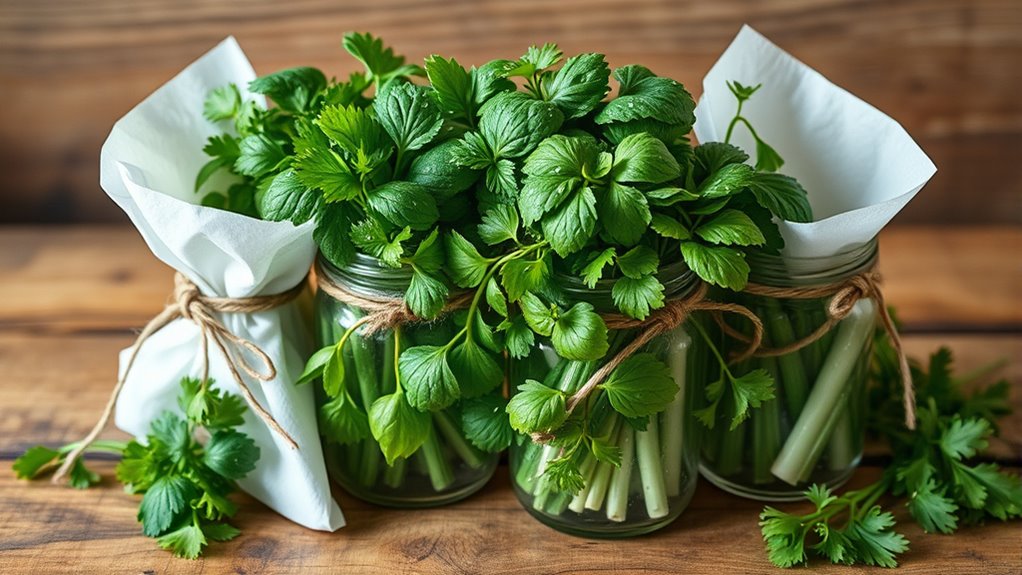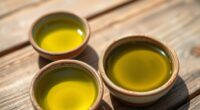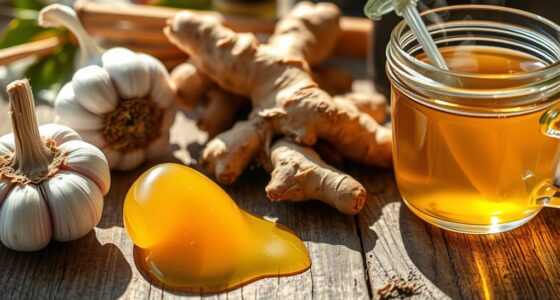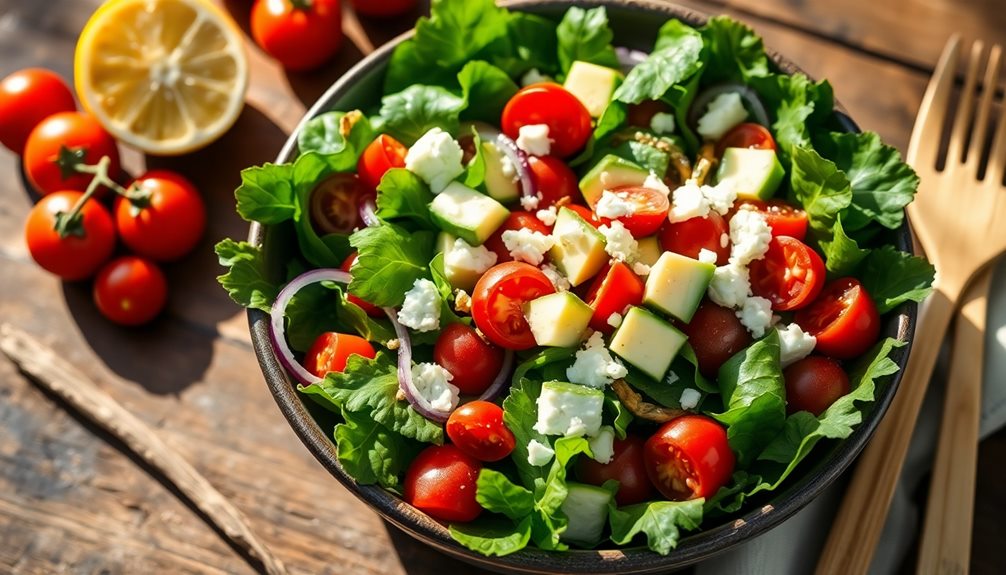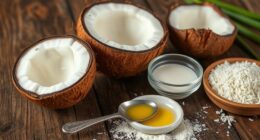To extend your fresh herbs’ shelf life by up to 200%, keep them hydrated by trimming stems and placing them upright in a jar with an inch of water, like a bouquet. Use glass or vented containers to maintain ideal moisture and airflow. Store in the refrigerator’s crisper or a cool, dark spot, invigorating water regularly and removing spoiled herbs. Continue exploring for more tips to keep your herbs fresh longer.
Key Takeaways
- Keep herbs upright in a jar with an inch of water, trimming stems for better absorption.
- Use clean glass jars or containers with vents to maintain optimal humidity levels.
- Store herbs in the refrigerator’s crisper drawer or a cool, dark place to slow spoilage.
- Regularly change the water and remove any decayed herbs to maintain freshness.
- Utilize technology-driven storage systems that monitor humidity and temperature for maximum longevity.
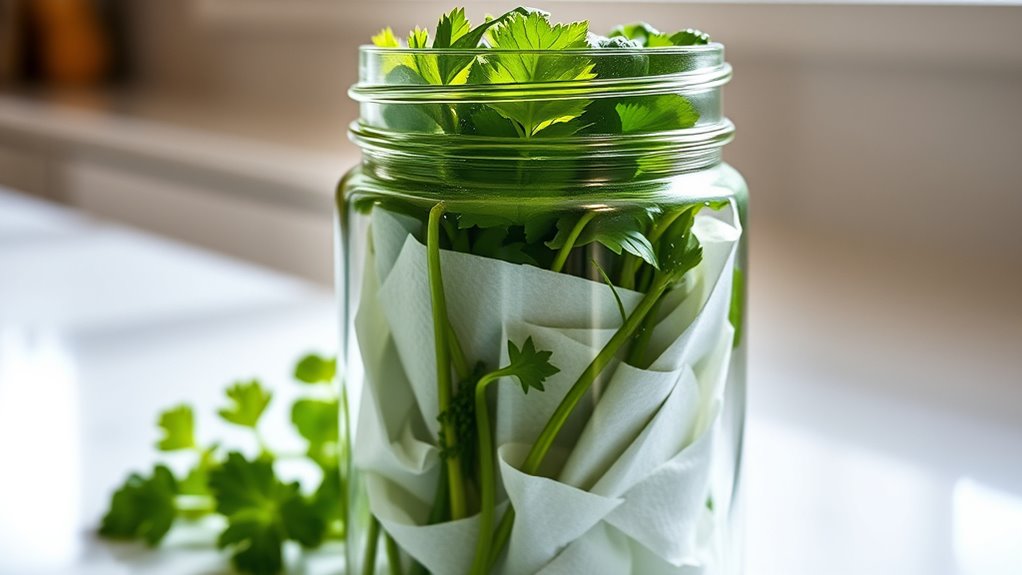
Storing fresh herbs properly can markedly extend their flavor and freshness. To achieve this, focusing on hydration techniques and choosing the right container options is essential. When herbs are kept hydrated, they stay crisp and vibrant longer, preventing wilting and spoilage. Hydration techniques involve methods that help maintain moisture levels, such as trimming the stems and placing them in water, much like cut flowers. You should trim about half an inch from the bottom of the stems to open up capillaries, allowing better water absorption. Then, place the herbs upright in a jar or glass filled with about an inch of water. This method keeps their stems submerged and prevents them from drying out. Alternatively, you can wrap herbs loosely in a damp paper towel and store them inside a container, but this method may not sustain hydration as effectively over several days. Proper storage methods are especially important for maintaining the herbs’ essential oils and aromatic compounds, which are vital for flavor preservation. Container options play a vital role in how well your herbs stay fresh. Glass jars, such as pint-sized mason jars, are excellent because they let you see what’s inside and are easy to clean. Plastic containers with tight-fitting lids also work well, especially if they have vents to regulate moisture. When selecting a container, ensure it’s clean and dry before adding your herbs. You might consider using a perforated container or one with small holes if you want to promote airflow and prevent excess humidity, which can lead to mold. For longer-term storage, some people opt for specialized herb containers designed to maintain optimal humidity levels. These containers often have adjustable vents and are made to keep herbs fresh without excess moisture that causes spoilage. Choosing the right container is a crucial part of effective storage because it influences airflow and moisture retention. Proper hydration combined with the right container helps preserve the herbs’ aroma, flavor, and texture considerably longer. Additionally, technology-driven solutions are emerging to help monitor and maintain ideal storage conditions automatically. Regularly changing the water and removing any herbs that show signs of decay is essential for optimal freshness. Using proper storage environments like the refrigerator’s crisper drawer or a cool, dark spot can further extend freshness. Proper hydration combined with the right container helps preserve the herbs’ aroma, flavor, and texture considerably longer. Remember, the key to extending their shelf life by 200% is consistency—check on your herbs daily, refresh the water, and remove any spoiled foliage immediately. Effective herb storage is the key to maximizing freshness and flavor. By combining hydration techniques with thoughtful container choices, you can enjoy fresh herbs for more days and make the most of their culinary potential.
Frequently Asked Questions
Can I Store Herbs at Room Temperature Long-Term?
Storing herbs at room temperature long-term isn’t ideal, as they tend to wilt and lose flavor quickly. Instead, you should explore herb drying techniques like hanging herbs upside down in a cool, dry spot. Use herbal storage containers that are airtight to preserve freshness. This way, you extend their shelf life markedly and keep your herbs flavorful and vibrant, rather than risking spoilage at room temperature.
Which Herbs Last the Longest When Stored?
Herbs that last the longest are like the superheroes of your garden! Thyme, rosemary, and oregano are champions, especially when you use herb drying and root preservation techniques. These methods boost their durability, making them practically immortal in your storage. So, if you want herbs that stand the test of time, focus on these resilient varieties and master the art of herb drying and root preservation for maximum longevity.
Does Wrapping Herbs in Paper Affect Their Freshness?
Wrapping herbs in paper helps maintain their freshness by providing moisture control, which prevents excess humidity that can cause spoilage. Paper wrapping absorbs excess moisture, reducing mold and decay, and allows air circulation so herbs don’t become slimy. You should gently wrap herbs in paper and store them in the fridge. This simple step keeps herbs fresh longer, extending their shelf life and preserving their flavor and texture.
How Do Humidity Levels Impact Herb Storage?
They say “a little moisture goes a long way,” and it’s true for herbs too. Humidity levels play a key role in herb storage—too high, and mold prevention becomes difficult, spoiling your herbs quickly. Proper humidity control keeps herbs fresh longer by preventing excess moisture that can lead to decay. To extend shelf life, aim for moderate humidity, and make certain of good airflow to maintain their vibrant flavor and texture.
Can I Freeze Herbs in Oil for Preservation?
You can freeze herbs in oil using herb freezing techniques that lock in flavor and freshness. Simply chop your herbs, place them in ice cube trays, cover with olive oil, and freeze. Herb oil infusion benefits include preserving herbs for longer periods and adding rich flavor to dishes. This method prevents spoilage, extends shelf life, and makes it easy to add fresh-tasting herbs to recipes anytime.
Conclusion
Now that you know how to store your fresh herbs properly, think of your kitchen as a lush garden where these delicate treasures can flourish far longer. With just a little care, you’re nurturing tiny green miracles that brighten your dishes and your day. Treat your herbs like precious gems, and they’ll reward you with vibrant flavor and freshness that lasts. Your culinary garden is now ready to bloom, transforming every meal into a masterpiece.
